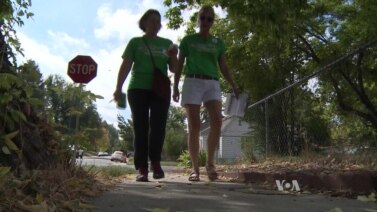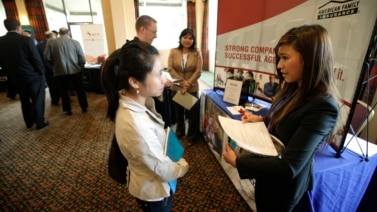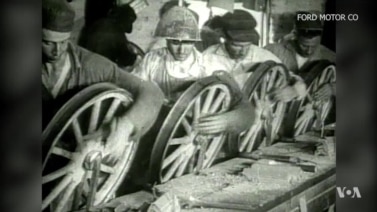The election in the United States next month is not just about who will be the next president. There are many local issues on the ballots as well.
For example, some states are considering making marijuana use legal. Other cities are thinking about raising taxes to help fund civic projects.
In the northeast state of Maine, voters will decide whether or not to increase the minimum wage. The minimum wage is the lowest salary an employer is permitted to pay an employee.
Today, the federal government requires employees to be paid at least $7.25 an hour. But voters in Maine are considering raising the minimum wage each year so that it reaches $12 an hour by 2020.
Vermont Senator Bernie Sanders' campaign for the Democratic Party's presidential nomination brought attention to income inequality. Income inequality is the term used to describe the difference in wealth between the richest and poorest Americans.
Hillary Clinton defeated Sanders and won the Democratic nomination. She said she supports an increase in the minimum wage. Her opponent, Donald Trump, said he believes individual states should decide for themselves.
A group called Fight for $15 believes workers should be paid no less than $15 per hour. They have protested outside the presidential debates.
In the city of Portland, Maine, Hillary Morrison is a bartender at Vena's Fizz House.

She has debts and expenses: food, rent, transportation and student loans.
But unlike many people who work making drinks or serving coffee, she has only one job.
That is because her boss, Steve Corman, pays his employees a good salary.
Morrison earns about $30 per hour on a busy night. Corman pays the bartender about $9 per hour. She gets the rest from tips, extra money customers pay for good service.
Under the current law in Maine, Corman could pay her less than $4 per hour since she is an employee who receives tips.
Morrison said her salary is “incredible.” She said she would have to work two or three jobs in order to pay her bills without it.
While some people may be surprised that a bartender or waiter can earn $30 per hour, Corman thinks the higher salary is a good investment. He said his employees work hard, are loyal to his business and develop strong relationships with customers who come back again and again.
Chris Tyll owns a pizza restaurant in Portland called Pat's Pizza. He sees the minimum wage issue differently. He said he is worried voters might not understand why increasing the minimum wage could hurt a business like his.

After adding up the cost of ingredients and labor, he said selling one pizza does not make that much money for the restaurant.
If restaurants had to pay their employees $12 per hour, a pizza might cost as much as $30.
Tyll said people might not eat at such a costly pizza shop.
“We're asking people to make a decision, 10 seconds in a ballot box, as they look at this question,” Tyll said. He said he wants to see more of an effort to help workers learn new skills so they can get better jobs.
Economists are not sure how a higher minimum wage would affect local economies.
Some think workers would spend more if they made more, which would boost business. Others say businesses would be forced to raise prices without a guarantee that people would spend more for goods and services.
The Economic Policy Institute said the current federal minimum wage of $7.25 per hour is not high enough to support the cost of living in the U.S. The institute also said the U.S. economy could still do well if minimum wage rose to $12 per hour by 2020.
I'm Dan Friedell.
Katherine Gypson wrote this story for VOANews.com. Dan Friedell adapted it for Learning English. Caty Weaver was the editor.
Does your country have a minimum wage? Do you think it is a good idea? We want to know. Write to us in the Comments Section or on our Facebook page.
Words in This Story
bill - n. a document that said how much money you owe for something you have bought or used
rent - n. money that you pay in return for being able to use property and especially to live in an apartment, house, etc., that belongs to someone else
boss - n. the person whose job is to tell other workers what to do
tip - n. an extra amount of money that you give to someone (such as a waitress or waiter) who performs a service for you
boost - n. an increase in amount
ingredient - n. one of the things that are used to make a food, product, etc.
incredible - adj. difficult or impossible to believe
bartender - n. a person who serves drinks at a bar or restaurant
income - n. money that is earned from work, investments, business, etc.
marijuana - n. the dried leaves and flowers of the hemp plant that are smoked as a drug



